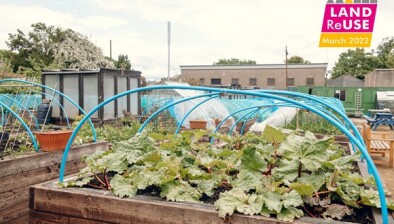Community Wealth Building key to creating stronger Scottish communities
Scotland’s Community Wealth Minister Tom Arthur, and EDAS chair Liz McEntee with internationally-renowned community wealth building experts Ted Howard and Neil McInroy, at an EDAS conference on the subject in Edinburgh last summer.
The rise of community wealth building will become an increasingly influential component of creating a fairer, stronger and more sustainable Scottish economy, according to experts.
Local authorities, enterprise agencies, charities and others are being encouraged to embrace the concept as a means by which to support local businesses and jobs while encouraging responsible investment to retain wealth locally.
With the Scottish Government poised to begin consultation on new policy to drive the agenda - and emerging as a world leader in adding scale to it - the Economic Development Association Scotland (EDAS) has released a new guide, Implementing Community Wealth Building.
It explains the ethos behind the vision and how it can be rolled out - from developing more local and social enterprises to embedding fair work and ensuring investments deliver true benefits for local people.
Community wealth building is an internationally recognised model of economic development designed to tackle long-standing systemic challenges facing local, regional and national economies by considering the ways in which wealth is generated, circulated and distributed.
Through deliberate and practical action, it seeks to direct and retain more wealth in communities by creating new fair work opportunities, helping local businesses and inclusive business models to expand and placing more assets in the hands of communities, ensuring that collective wealth works better for people, place and planet.
EDAS chair Liz McEntee. said: “Community wealth building is about cementing and augmenting existing practice and challenging ourselves to do things differently to deliver a functional wellbeing economy across our regions and local areas.
“This cannot be achieved through simply redistributing wealth, but must be hard-wired into everything we do - placing the wellbeing of current and future generations at heart of economic systems, balancing prosperity with the principles of equality, sustainability and resilience.
“We have heard from international experts on how this really can play a key part in improving local economies and delivering real good. It’s an exciting concept which we are keen to help organisations of all kinds embrace so that the good from it can grow.”
EDAS is the country’s foremost membership driven association for all organisations and individuals with an interest in economic development.
Much of the guide’s advice has been influenced by a series of events held to explore community wealth building and where it is already seeing success, with projects in places including North Ayrshire, Dundee and at Loch Ness.
People, authorities and organisations are being encouraged to build work around five pillars:
- Inclusive ownership (developing more local and social enterprises which generate community wealth, including social enterprises, employee owned firms and cooperatives).
- Spending (maximising community benefits through procurement and commissioning - developing good enterprises, fair work and shorter supply chains)
- Finance (ensuring that flows of investment and financial institutions work for local people, communities and business)
- Workforce (increasing fair work and developing local labour markets that support the wellbeing of communities)
- Land and property (growing the social, ecological, financial and economic value that local communities gain from land and property assets)
Scotland’s minister for public finance, planning and community wealth, Tom Arthur MSP, will discuss community wealth building in a webinar hosted by EDAS and the Organisation for Economic Co-operation and Development (OECD) today.
This is the first joint event in an exciting new series between EDAS and the OECD’s Local Employment and Economic Development programme (LEED) which will offer conversation spaces on shared policy and practice interests in the months ahead.







